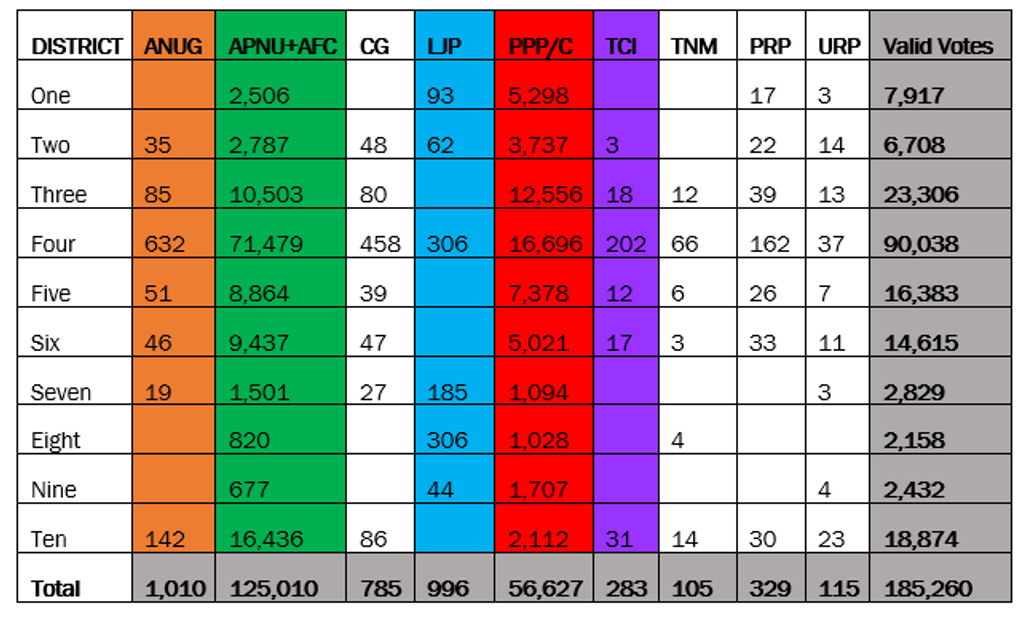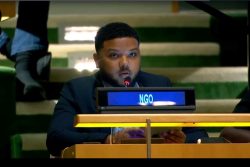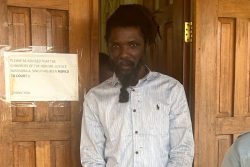While confirming that the PPP/C won the majority of votes at the March 2nd polls, Chief Election Officer (CEO) Keith Lowenfield yesterday reported to the Guyana Elections Commission (GECOM) that the results of the process that he oversaw do not meet the standard of fair and credible elections.
Lowenfield’s summation for each Electoral District contends that identified anomalies and instances of voter impersonation do not appear to satisfy the criteria of impartiality, fairness, and compliance with provisions of the Constitution and the Representation of the People Act.
“Consequently, on the basis of the votes counted and the information furnished from the recount, it cannot be ascertained that the results… meet the standard of fair and credible elections,” he concluded in each summary of the observation reports for every District.
Lowenfield’s shocking report has already attracted the criticism that he went beyond his mandate. His report will now be a major test for GECOM Chair Claudette Singh, who will have to vote in the coming days on whether the recount result should be used to declare the winner of the crisis-ridden elections.
GECOM is also to receive a report from a CARICOM team which observed the 33-day recounting of votes. A team from the Organisation of American States, which also observed the recount, has said that the result can be used to declare the winner of the polls.
The Order which governs the recently concluded National Recount provided for the matrices for the recount of the 10 Electoral Districts to be tabulated by the CEO before being submitted in a report, together with a summary of the observation reports for each District, to GECOM.
These matrices, which were certified by GECOM’s Secretariat, show that the PPP/C’s list of candidates has secured 233,336 votes compared to the 217,920 secured by the incumbent APNU+AFC coalition. This means the PPP/C has won the March 2 General Elections by 15,416 votes.
Lowenfield, however, has argued, in line with the position of the APNU+AFC, that the results were not credible.
In a blistering condemnation of his own performance and that of thousands of polling day staff employed by the Commission, Lowenfield has claimed in District Four, for example, that a total of 466 ballot boxes stand affected due to a total of 1,862 anomalies and/or alleged voter impersonation and unreconciled ballot boxes.
“In other words, approximately 55% of all votes cast for general elections [in that District] stand to be impacted due to either anomalies and/or voter impersonation or unreconciled ballot boxes. Specifically, 7.2% of the votes cast were impacted by anomalies, 39.2% were impacted by voter impersonation, 3.4% impacted by both anomalies/irregularities and voter impersonation, and 5.7% impacted by unreconciled ballot boxes,” he claimed.
Notably, the structure of the CEO’s summation mirrors closely the claims made by APNU+AFC agent Joseph Harmon and President David Granger.
On Friday, the caretaker president during an interview on Benschop Radio stated the party was committed to removing illegitimate votes from the count.
“We are committed to ensuring that bogus votes, that people who were not in the jurisdiction, people who have no form of identification will not be allowed to vote,” the President stressed.
In line with this narrative, Lowenfield has presented an alternative count for each District.
In District One, he contends the if the ballot boxes affected by the anomalies/irregularities and voter impersonation are extracted from the process, the total will be 7,917 votes cast, with a distribution for the larger parties of 2,506 votes for APNU+AFC and 5,298 votes for PPP/C. Currently there are 12,111 valid votes cast in District One.
In District Two, the alternative count would see a total of 6,708 votes cast with a distribution of 2,787 votes for APNU+AFC and 3,737 votes for PPP/C. There are currently 26,564 valid votes cast in District Two.
In District Three, the valid votes cast would fall from 72,592 to 23,306 votes with a distribution of 10,503 votes for APNU+AFC and 12,556 votes for PPP/C.
Further in District Four, the largest electoral district, valid votes would fall from 202,077 to 90,038 votes cast, with a distribution of 71,479 votes for APNU+AFC and 16,696 votes for PPP/C.
Across all ten districts the CEO is suggesting that only 185,260 votes cast can be considered valid. The verified figure from the National Recount is 460,295 votes.
Of the number of votes deemed valid, the majority was cast in favour of the incumbent.
Lowenfield’s alternative count grants the coalition 125,010 votes and the PPP/C 56,628.
The evidence used to deem nearly 60% of votes invalid includes breaches of polling procedures outlined in the Representation of the People Act and the official manual for Presiding Officers and other Polling Day Officials (Revised 2019) as well as alleged voter impersonation.
Certificate of employment
In District Four, the CEO states that there were 18 instances where evidence to validate the usage of a certificate of employment were missing; 56 instances where the oath of identity that is required by the statutes for electors voting without ID cards were missing; 82 instances where extra ballot papers were found in or missing from ballot boxes without the requisite documentation; and 47 instances where the statutory documents required to reconcile ballots cast at the respective polling stations were missing.
These statutory documents include marked lists of electors, folios, counterfoils, unused ordinary and tendered ballots, spoiled and rejected ballot papers and poll books.
Lowenfield explains that it was the Commission’s intention to reconcile the ballots cast for each List of Candidates with statutory documents contained in each ballot box but “during the recount exercise, an unusual pattern of missing statutory documents was discovered in 47 ballot boxes from Polling stations on the East Coast Demerara.
“The absence of those key statutory documents rendered the required reconciliation of 11,566 votes allocated to the nine List of Candidates impossible and consequently void of accuracy,” he concluded, before adding that these missing documents were not contained in the Returning Officer’s package (PE 2) dispatched to the Returning Officer’s Office nor were they with the non-sensitive electoral materials returning to the secretariat.
Several presiding officers have since claimed that they were instructed by the Office of District Four Returning Officer Clairmont Mingo not to include these statutory documents in the ballot boxes.
Addressing allegations of impersonation, Lowenfield noted that it was alleged that there were 1,706 instances of voter impersonation.
“The party alleged that based on their investigations in this region; there were 16 instances where deceased persons appeared to have voted and 1,690 instances where electors who are alleged to be out of the jurisdiction were recorded as having voted,” he said of the APNU+AFC.
‘Of substance’
Although the coalition never presented evidence in support of the majority of these allegations, Lowenfield said that responses from the Chief Immigration Officer and review of the General Register Office’s Deceased Reports confirmed that these allegations were of substance.
The coalition has presented to the Commission three lists totalling less than 1,000 persons who they claim were out of the jurisdiction but voted on March 2. Chief Immigration Officer Leslie James “confirmed” that 172 of these individuals had left the jurisdiction and not returned before polling day. Despite this confirmation, around two dozen persons from that list of 172 have so far have publicly stated that they were in the country.
A series of death certificates provided as proof of impersonation also did not survive scrutiny as it was found that no votes were cast on behalf of the named electors in some cases. In at least one case, the certificate was found to be that of a person who died in 1987 at least 20 years before the current list of electors was compiled.
This did not stop the CEO from declaring for each and every electoral district that the allegations of impersonation “were of substance.”
Even in cases when the numbers do not support the APNU+AFC’s preferred narrative, Lowenfield has cited them in his reporting. For example, the Coalition has repeatedly argued that a significant number of disciplined services ballots had been rejected because they were unstamped. This is not supported by the numbers but Lowenfield in his report recorded unstamped ballots as a “noteworthy procedural error.”
Based on the information provided by the CEO there were a total of 397 unstamped ballots at the General Elections. This number is 9% of the total 4,213 rejected ballots and a mere 0.09% of the total 464,565 valid votes cast, according to the recount. Even if Lowenfield’s alternative count were used, the unstamped ballots would remain insignificant as they represent 0.2% of the 185,260 votes Lowenfield has deemed valid.
The Commission will spend the next few days deliberating on the report. According to the Order they will have to decide whether to request that Lowenfield use the data compiled as the basis for the submission of a report under section 96 of the Representation of the People Act.
It is this second report which will be used to formally declare a winner of the March 2 polls.









